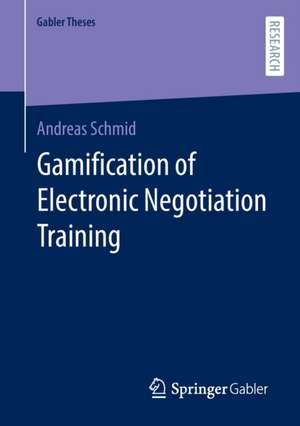Gamification of Electronic Negotiation Training: Gabler Theses
Autor Andreas Schmiden Limba Engleză Paperback – 16 iul 2022
Din seria Gabler Theses
- 15%
 Preț: 642.51 lei
Preț: 642.51 lei - 15%
 Preț: 639.08 lei
Preț: 639.08 lei -
 Preț: 346.09 lei
Preț: 346.09 lei - 15%
 Preț: 576.89 lei
Preț: 576.89 lei - 15%
 Preț: 576.58 lei
Preț: 576.58 lei - 18%
 Preț: 803.53 lei
Preț: 803.53 lei - 15%
 Preț: 578.37 lei
Preț: 578.37 lei - 15%
 Preț: 642.36 lei
Preț: 642.36 lei - 15%
 Preț: 701.59 lei
Preț: 701.59 lei - 15%
 Preț: 636.63 lei
Preț: 636.63 lei -
 Preț: 388.90 lei
Preț: 388.90 lei - 15%
 Preț: 577.07 lei
Preț: 577.07 lei - 15%
 Preț: 578.87 lei
Preț: 578.87 lei - 15%
 Preț: 638.76 lei
Preț: 638.76 lei - 15%
 Preț: 575.59 lei
Preț: 575.59 lei - 15%
 Preț: 579.20 lei
Preț: 579.20 lei - 15%
 Preț: 640.71 lei
Preț: 640.71 lei
Preț: 635.01 lei
Preț vechi: 747.06 lei
-15% Nou
Puncte Express: 953
Preț estimativ în valută:
121.52€ • 131.96$ • 102.08£
121.52€ • 131.96$ • 102.08£
Carte tipărită la comandă
Livrare economică 23 aprilie-07 mai
Preluare comenzi: 021 569.72.76
Specificații
ISBN-13: 9783658382605
ISBN-10: 3658382600
Pagini: 200
Ilustrații: XVII, 200 p. 28 illus., 11 illus. in color.
Dimensiuni: 148 x 210 mm
Greutate: 0.27 kg
Ediția:1st ed. 2022
Editura: Springer Fachmedien Wiesbaden
Colecția Springer Gabler
Seria Gabler Theses
Locul publicării:Wiesbaden, Germany
ISBN-10: 3658382600
Pagini: 200
Ilustrații: XVII, 200 p. 28 illus., 11 illus. in color.
Dimensiuni: 148 x 210 mm
Greutate: 0.27 kg
Ediția:1st ed. 2022
Editura: Springer Fachmedien Wiesbaden
Colecția Springer Gabler
Seria Gabler Theses
Locul publicării:Wiesbaden, Germany
Cuprins
Introduction.- Theoretical Background.- Design Science Research Methodology.- A Framework for Gamified Electronic Negotiation Training.- Gamifying Electronic Negotiation Training – A Mixed Method Study of Students’ Motivation, Engagement and Learning.- Rankings or Absolute Feedback? Investigating Two Feedback Alternatives for Negotiation Agreements in a Gamified Electronic Negotiation Training.- Gamification of Electronic Negotiation Training: Effects on Motivation, Behaviour and Learning.- Discussion & Outlook.
Notă biografică
About the author
Andreas Schmid was a research assistant at the Information Systems Department 1 - Organisational Communication at the University of Hohenheim, Germany, and is currently
working as an IT specialist. His research interests include gamification, e-learning, negotiations, and software development.
Textul de pe ultima copertă
Organisations are involved in various types of negotiation. As digitalisation advances, such business negotiations are to a large extent electronic negotiations. Consequently, dedicated training for such electronic negotiations is important for mastering negotiation skills. The present book develops a new approach for a motivating and improved e-negotiation training by applying gamification, i.e. using game design elements in a non-game context, in order to improve participants' motivation, engagement, and learning outcomes. A negotiation support system used within an e-negotiation training is enhanced with game design elements. The book describes the design process, its theoretical foundations, and the evaluation of the gamified negotiation support system. The final quantitative evaluation shows higher motivation, engagement and better learning outcomes for participants in the gamified training compared to a conventional training. Organisations can employ the designed artefact for fundamental and effective e-negotiation training. Additionally, the book provides insights in how to design a gamified system for a particular application context.
About the author
Andreas Schmid was a research assistant at the Information Systems Department 1 - Organisational Communication at the University of Hohenheim, Germany, and is currently
working as an IT specialist. His research interests include gamification, e-learning, negotiations, and software development.
